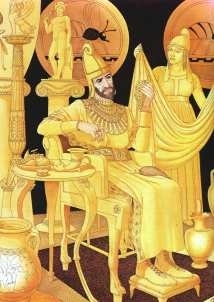 As Silenus was dragged through town, King Midas saw him and restored him to Bacchus since Silenus was Bacchus' surrogate father.
As Silenus was dragged through town, King Midas saw him and restored him to Bacchus since Silenus was Bacchus' surrogate father.
Bacchus was overjoyed and told Midas he would grant any wish he desired.

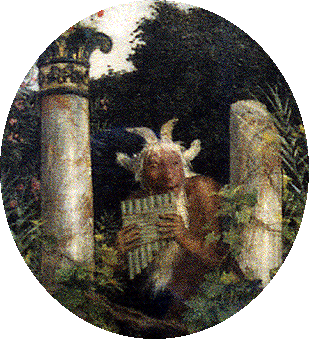
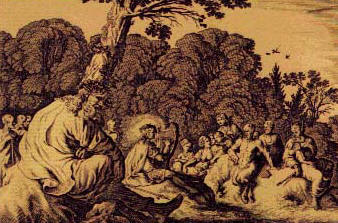
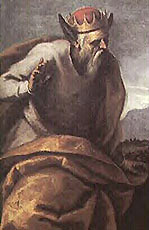



| « | March 2009 | » | ||||
| S | M | T | W | T | F | S |
| 1 | 2 | 3 | 4 | 5 | 6 | 7 |
| 8 | 9 | 10 | 11 | 12 | 13 | 14 |
| 15 | 16 | 17 | 18 | 19 | 20 | 21 |
| 22 | 23 | 24 | 25 | 26 | 27 | 28 |
| 29 | 30 | 31 | ||||
 As Silenus was dragged through town, King Midas saw him and restored him to Bacchus since Silenus was Bacchus' surrogate father.
As Silenus was dragged through town, King Midas saw him and restored him to Bacchus since Silenus was Bacchus' surrogate father.
Bacchus was overjoyed and told Midas he would grant any wish he desired.









What does the novel, An Imaginary Life, have to do with a classical foundations of literature class?
Where do I begin? How about broadly? In the beginning of the course there were a number of themes and conflicts, Steiner’s, we discussed. The past possesses the present. All literature is displaced myth. Women and misogyny. Mythology is the truth, history is the facts. These themes permeate Malouf’s short, intricate little novel but are not necessarily easy to identify.
As I was choosing passages and quotes to use in this reflection, I had to choose quickly in order to let a fellow student borrow the book. Because time was limited I chose a number of quotes from the beginning and end of the book. These portions seemed the most psychological and philosophical, which makes them rather hard to digest. The center of the book is the main story, the adventure. After I examined the beginning for quotes, I thought Malouf did a fantastic job foreshadowing the meaning of his novel, what he was trying to capture, share.
The book is littered with references to dreams, reality, the surreal, language, remembrance, gods, animals, the weather, seasons, and the natural world. These help give it its mythological feeling, a timeless, cyclical sense and motion.
We talked a lot about music in the first part of the class. Music, tones, and tunes were how Ovid was able to make any sense of his new world in exile, an exile to a land of barbarians and witchcraft. “I listen and what moves me most is that I recognize the tunes” (21). He doesn’t even have to know the language to understand the basic meaning, feeling, or emotion of the speaker.
A major aspect of classical literature, especially recently, has been gods, gods of many different emotions and abilities. In An Imaginary Life Ovid describes an interesting dream with ‘men on horses, the centaurs, from the world of fables,’ which he mentions are ‘What I don’t believe in’ (23). He says the centaurs from his dream are gods, ‘In whom I also do not believe.’ (24). He continues this discussion of gods, which seems to me to foreshadow the rest of the book.
If the gods are there, it is because you have discovered them there, drawn them up out of your soul’s need for them and dreamed them into the landscape to make it shine. … It is our self we are making out there, and when the landscape is complete we shall have become the gods who are intended to fill it. (28)
This passage reflects the end quite well. The last line, ‘I am there,’ could easily be argued that Ovid is there, a god; at the last moments of his life he has finally reached the understanding that the landscape is always complete. We need only to recognize it’s completeness to reach the status and consciousness that we are the gods roaming, destroying, discussing, the earth and its inhabitants. Realizing his destiny Ovid does not repent but accepts it, “I shall settle deep into the earth, deeper than I do in sleep, and will not be lost. We are continuous with earth in all particles of our physical being, as in our breathing we are continuous with sky. Between our bodies and the world there is unity and commerce” (147). Sure, this is the more or less quintessential ‘hippy’ viewpoint, but it sure does look good on paper. Ha, I wonder if Malouf envisioned his Ovid character as a hippy?
What I found captivating is how the Ovid in the novel fluctuates between worlds. On the hunting trips he is mesmerized with the child, at home in the rugged wilderness. During the couple years while he plans to trap the child, he can’t stop thinking about the boy, about the world of the boy, how the boy interprets the world. He unconsciously seems to desire the boy’s world even though his civilized, manipulated mind tells him otherwise. When they finally capture the child, Ovid tries unbelievably hard to prescribe civilization onto the boy, teaching him language, forcing him to live in doors and to eat lightly processed foods. Through all this I was practically screaming at my book for Ovid to give up, let the boy be. He tries all this to get closer to the child, to understand the child by prescribed language. Because humans have prescribed language to the natural world in order to try and make sense of it, we have only detached ourselves father from nature.
Once the Child and Ovid run away their real connection begins. “And yet for all this closeness, he seems more and more to belong to a world that lies utterly beyond me, and beyond my human imagining” (149). Only after Ovid has submerged himself into the Child’s world does he begin to understand it, and the Child. It’s also interesting to note one of Steiner’s conflicts here: age and youth. At first, older Ovid tries to connect with the young child by prescription; however in the end of the book, the child nurses Ovid. And unknowingly to both of them, the child is the one who connects them to an anagogic degree. (Is it bad or ironic that I had to tell Microsoft Word to add the word anagogic to its database? Maybe both.) I can’t remember where the line was, maybe during one of the hunting trips where they worship the dead warriors, but there were also transformations in the book. The passage I noted reads, “We have all been transformed, the whole group of us, and become part of the woods.” The entire book seems to transform the child, and Ovid, into gods.
Similar to A Tree, A Rock, A Cloud, Ovid experiences the power of love, even unto simple subjects. The color scarlet, and the poppy, “I Love this poppy.” By beginning small it becomes possible to think big.
It is this love that leads Ovid, eventually, to discover his love for the boy as he is, uncivilized, which in turn leads to Ovid’s love for the earth and world from a god’s perspective. At one point I even remember Ovid describing the scene of the boy and him trudging across the landscape from the level of the stars, the level of a god. Which brings me back to a quote in the beginning, “it is like trying to remember something you have forgotten, that glows at the very edge of your mind but refuses to reveal itself” (20). Ovid knew all this to begin with; it just took an amazing adventure with a Child to remember it.
The label ‘classic’ is given to something that is judged, after a lengthy period of time, to be of the highest possible quality or value of its kind (any dictionary). So maybe to answer the question, ‘what does An Imaginary Life, by David Malouf, have to do with Classical Foundations of Literature?’ I could say everything, anything, and all of the above; but isn’t that usually the easy route?
To begin I'll admit that my background on christianity is very limited. Growing up I never went to church except on two occasions, that I remember, with friends' families. Luckily for me my parents kept my siblings and I occupied with sports, music, movies, games, and family activities indoors and out rather than go to church. In fact my father admitted to me that he lost interest in religion as a child when his parents stopped going to church but sent my father and brother by themselves on their bikes. And of course, without parental supervision, my father said he and his brother immediately quit going to church but used the time away from parents to go peruse the town and keep themselves entertained in other ways - most likely mischief.
Browsing some blogs this afternoon, I ran across Jake's entry titled Revenge as a question to the authenticity of religion.
Jake's short but insightful blog recognizes the similarities between the great floods in the Bible and Ovid's Metamorphoses, which he end with an excellent last sentnece that reads, " the fact that both of these stories have stunning parallels calls to question the possibility that religions such as Christianity and other creation stories that include the idea of "the great flood" perhaps stole the idea from Greek literature."
You are indeed on the right track Jake. Last year I was introduced to an award winning, maybe slightly overdone, documentary titled Zeitgeist. However this movie revealed, for me, some stunning connections between Christianity and other world religions, past and present. Zeitgeist is defined as 'the defining spirit or mood of a particular period of history as shown by the ideas and beliefs of the time.'
What it boils down to is that much of the Christian myth is incredibly similar to ancient Egyptian religion and the common god Horus; and throughout human history there are hundreds of other religions and deities that share similar connections. It is one amazing story.






When reading the Commentary on Greek Comedy I was, surprisingly, relating it more to last semester’s reading for English 300, Don Quixote. Besides being the funniest book I’ve every read, it also has one of the most tragic endings. It is a perfect balance of comedy and tragedy. If you do not want me to ruin the book for you, don’t read to far along; however, even if this blog ruins the ending of DQ for you it still deserves to be read, to be experienced first-hand, word by word, all 900-and-some pages.
In Greek, drama meant ‘to do, to act’ a story. The story was typically a tragedy, comedy, or satyr. And if you’ve taken a class with Marvin Lansverk this helps explain his obsession with puppets and ‘doing’ something.
Ruden writes, “no one has any idea how comedy – or tragedy – came to have its particular form. … (She) can characterize comedy by turning the better known genre of tragedy upside down and shaking it.”
But in their basic form comedy and tragedy are comprised of the ‘same main medium, language.’ This brings me back to lit crit and the simplistic notion that all literature, and therefore language, is letterally – my version of literally – created with letters and words. This means that there are of course going to be crossovers and similarities between tragedy and comedy. Ruden briefly writes about this on pages 114-115. “The marvelous poetic qualities of surviving comedy suggest that this genre had not much less reliance on words.” “… the generally similar metrical format of tragedy and comedy kept them closer together in subject matter and tone than anything else did.”
Depending on the words used, the genre and level of literature can be considered. Think about the word anagogy we discussed in class. Anagogy refers to literature of the heavenly realm, gods, deities, and the supernatural or unexplainable, words that refer to another world, that create their own nature rather than reside on our own. Ruden writes, “The most ornate words are for the gods: words that look outward from the drama’s story into yet another world.”
Returning to comedy, tragedy, and Don Quixote I can explain how this epic novel contains both genres, though much more comedy. To begin, Don Quixote brings about his comedic trails and tribulations by means of his own, rather hilarious, transformation into a knight errant. In an anagogic sense DQ liberates himself from the common world and creates his own chivalric knight errant world in his head; however, everyone else in the novel are still members of the common world which makes DQ’s experiences all the more funny. “Laughter is more likely after events unlikely, unexpected, or absurd.” Practically everything DQ does, especially in the beginning, is unexpected. But when Ruden writes, “Comedy, whose scenes are not taken up with the somewhat stereotyped big events of tragedy, such as the recognition of lost relatives, jumps between incidents of considerable variety and oddity;” an interesting thing can be mentioned about DQ. His scenes are certainly of considerable variety and oddity, but each scene is told as though it was a tragedy, drawn out with enough detail and big, sometimes violent events take place.
The use of the chorus in Greek plays is somewhat reflected in DQ’s partner in comedic tragedy, the infamous squire, Sancho Panza. “Whatever strange things go on, the chorus makes them stranger.” This perfectly parallels Sancho. Whatever strange event DQ gets involved in, something just as strange, if not more so, happens to Sancho.
Don Quixote can also relate to the theory that ‘Comedy is reactive. Tragedy is about the universe.” It is the mismatched universe in which Don Quixote rides about doing his knight errant business that makes it a tragic novel in one sense: he strives to be a knight errant in a society that doesn’t accept knight-errants; yet how Don Quixote and the people he encounters react to these two clashing worlds is what makes it a comedy as well.
In order not to ruin the ending for those who haven’t read Cervantes’ masterpiece, I will end here. But know, that the ending is about the inevitable tragedies in the world, which affect not only DQ and Sancho but the reader as well.
Spring break arrived, I grew another year older, and spring break disappeared. Since my birthday always takes place sometime during spring break I never seem to get much homework done, the the break never seems long enough - what's new, eh? The past possesses the present, the present possesses the past, the future possesses the present and the past, and our nation's deficit is in the trillions; trillions! The earth is only estimated to be 4.5 billion years old - only slightly older than Dr. Sexson would claim he is. Where have all the trees gone? Oh yeah, to our deficit.
Ok, enough of that ridiculous rant. Lysistrata was one of the pieces of literature I've been wanting and expecting to read for a long time. It's bawdiness is unparalleled, it's entertainment never-ending. And it's relevance is supreme.
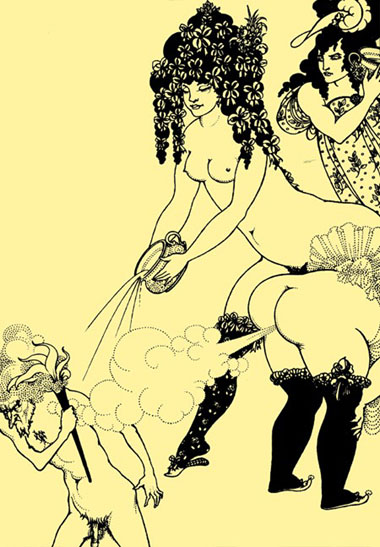
Sarah Ruden's translation is excellent, she captures the tone of the play with a modern vernacular that everyone can relate to. Throughout reading Lysistrata I couldn't help underlining all the sexual innuendos, laughing and in awe that such sexual references were as common during Aristophanes as they are today. And interestingly it seems that today such explicit sexual references are no less taboo. Why are people so 'grossed-out' by natural experiences? Why do people get so offended when nature takes its course? Dr. Sexson did give a disclaimer before we started reading Lysistrata and warned us that it was going to be X-Rated. Reading the play reminded me of talking with my close male friends, and some females, when we let our filthy minds think at the circumference and talk about ridiculously vulgar subjects, subjects that even arise in classical literature: animal sexuality and incest to name a few. "Gross!" You're probably saying, but hey that's the way it is and has been for a long time.
As I was reading the Commentary essays in the back I was struck by a number of passages. The Athenian women is especially interesting, mapping-out and explaining the unfair roles and attributes women were given or thought to have. Obviously women's rights have come a long way from women being 'considered naturally wild' and 'prone to every lawless passion.'
However, in the Athenian time period, a phallocentric time period, men seem to have brought about their own misguided interpretation of women. Men thought 'it was female nature to be uncontrolled,' and so they arranged marriages, which "was widely thought to contain all the solutions to the social problems of women (somewhat as childbearing was thought by the medical community to contain most of the solutions to their medical problems)." Now I'm no doctor but I know that women go through agonizing morning sickness and pain during pregnancy and labor. I guess I can see how Athenian men might think that once the child is born the woman is less sick due to her pregnancy, but still the theory is absurd. Ruden also writes that "A wife was an expensive and troublesome necessity - a necessity because the Greeks did not usually take an unmarried man seriously." Yet another example of how men brought about their own narrow-minded view of women at the time.
While I was reading this essay in the coffee shop, I was finishing up the passage about Semonides' poem comparing women to a range of animals when an ironic distraction happened. "The 'fox' is a liar, the 'dog' a loud shameless busybody, and the 'monkey' a hideous troublemaker." And it was about at this moment when a girl walked into the coffee shop, saw her friends, and started shrieking with excitement; this of course caused all her friends to let out a large cry too as they were all greeting and hugging each other. The whole coffee shop pretty much came to a stand still as everyone watched the ladies exchange their frivolous loud banter and hugs.
Ruden acknowledges that Lysistrata is unique in that it doesn't display whether the women are angry and upset with the way they are treated and discussed, besides remarking the 'outrageousness of female citizens being treated as slaves.' In Lysistrata the women seem to be content with their motherly roles, but it is the war that 'the men frivolously exacerbate and prolong,' that annoy the women enough to do something - quit having sex. And what makes this play so excellent in the genre of comedy, explicit bawdy comedy, is summarized superbly by Ruden: "That women have to make peace is less an encomium of women than a mockery of the men who have failed to do it." Hmm, perhaps women should band together during today's troubled times, withhold all sexual acts from their men, and in doing so resolve this country's frivolous war and deficit; it would be a challenge, it might work, but I doubt all the women, and obviously the men, could stand going without sex. It permeates our culture far to much now-a-days.
Although Athenian women were treated horribly they handled their 'circumstances with grace,' as women always do.
Now it's time to think about modern circumstances. Women of course deserve equal rights, income, and so forth - my mother is actually helping a lawyer make presentations in a case about a woman who wasn't getting paid as much as men in the same positions, the past still possesses the present - but will gender roles eventually come full circle? It seems that chivalry has disappeared with women's rights as cases of women being annoyed that men hold doors for them occur; more men are doing household chores - mostly in search of sex - and periodically you hear about the stay-at-home dad. Dr. Sexson even remarked that 'men are superfluous.'

If men have become unnecessary and women are able to earn a wealthy income and get artificially inseminated, what are we going to do with all the men? Nothing, I guess, since us men we'll certainly find something to fight about and kill each other, it seems to happen a lot.
I thoroughly enjoyed Plato’s Symposium: the bullshit sessions of all bullshit sessions – in the world. And it’s mythology, and it completely relates to modern scenarios.
“Let thy song be love, this love will undo us all! O cupid, cupid!” (Helen in Shakespeare’s Troilus and Cessida).
It’s rather ironic that these men are having a bullshit session about love. Hmm, they must really be in touch with their feminine side. But their bullshit session is superb. I was underlining and citing things so often that it’s crazy difficult to decide on anything to write about.
For starters, I was entranced by the frames, the speakers speaking for other speakers, in the Symposium. Apollodorus has an amazing memory. How he can recite the entire Symposium to his companion, which he knows only be being told about the bullshit session from Aristodemus, is unbelievable. In fact it is helpful to think of Socrates as a man of frames himself.
We mentioned Aristophanes circular man in class. As absurd as it sounds I actually found this incredibly interesting. I even tried to draw the globular man, but alas, I am not visual artist, more of a literate artist, I hope. But the four armed, four legged and two-headed man is more believable to me than any other religion, so far. When Zeus splits the man in two it completely makes sense that the two would desire to be whole again, an attraction to fulfill a missing part or half. “Each of us, when separated is but an indenture of a man, having one side only like a flat fish, and he is always looking for his other half”(17).
All the men had great speeches, and when taken in total every tangent of love seems to be mentioned, even acted. We talked about the octuplets a few Wednesdays ago and wondered if they could be connected with the Symposium. I think in fact they can. There were roughly eight men involved in the Symposium, so maybe we have our next set of old men on the way: eight brothers who will reunite, wearing codpieces and white hair, and discuss their lovescapades.
I couldn’t help but notice some similarities between Socrates and Alcibiades. One is the drunk the other is the D.D. – or so he seems. Everyone must have that friend that always drives, no matter what how much you think they’ve drank, they still maintain that they are “sober” enough to drive. Socrates is that D.D. He drinks with the rest of the gang, but always seems sober enough to drive home – or stay up all night and leave nonchalantly in the morning, much like the maniac in A Tree, A Rock, A Cloud: the maniacs know they’re right.
Even Alcibiades’s drunken chatter sounds strikingly similar to Socrates, who supposedly is sober. Alcibiades mentions this in his speech too; “For, although I forgot to mention this before, his (Socrates) words are ridiculous when you first hear them; he clothes himself in language that is as the skin of the wanton satyr – for his speech is of pack-asses, smiths, cobblers, and curriers and he is always repeating the same things in the same words, so that an ignorant man who did not know him might feel disposed to laugh at him ; but he who pierces the mask and sees what is within will find that they are the only words which have a meaning in them, and also the most divine, abounding in fair examples of virtue, and of the largest discourse, or rather extending to th whole duty of a good and honorable man” (42). As I am reading an abundance of Shakespeare, I have noticed a similar trend in his work: the fool or maniac has the most entertaining and subtly insightful lines.
If you’re still reading than you’ve made it through my rather rampant rambling, and will also know that I probably won’t be in class tomorrow. There are some snow cycles that are too good to miss.
It's been well over a week since I blogged. And I must admit it was a rough week. Luckily, my Shakespeare mini-play is over, making my shoulders a little lighter. Memorizing Shakespeare is actually quite satisfying though, and since I had a couple interesting characters it was more than entertaining.
But what really made the week agonizing was a good ski crash last saturday.
With fresh snow at the end of last week - and hopefully more and more arriving - I had to fling myself off some rocks and jumps. Well, one of those had been baking in the sun more than I thought. With the mashed-potato-snow, a flat landing, enormous skis, and a back-seat take off, I could do nothing to prevent my face from smashing into my knee. Upon crumbling I knew my nose was gonna bleed, and bleed it did, excessively, all saturday and finally quit completely by tuesday.
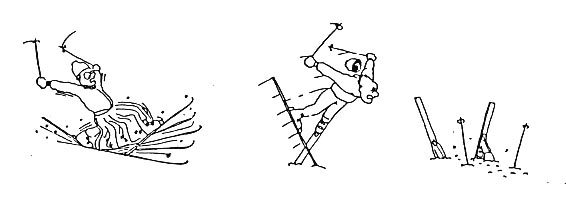
Although I didn't get an x-ray, I am fairly sure I broke my nose. It doesn't look real bad, but it is still sore, an odd sore that is centered in your face and makes it absurdly painful to blow your nose. It's feels crazy to notice your nose pop around out of place with the slightest smile or laugh. On the bright side though, my nose may be straighter now. It had an odd zig-zag but now I think it might be more aligned. Weird.
It’s another sunny Sunday, unfortunately. I don’t mind the sun but I prefer the weather to match the season, a little bit better than it has this year. We had one month of winter in December and since then it’s been mostly spring-‘ish.’ Yet I’m still banking on March and April to provide some opportunities to skip class and ski some fresh frozen precipitation; – don’t worry Dr. Sexson I’ll be sure to make it to your class, one of only a few that are enlightening, exceedingly entertaining (especially since I’ve counted a number of times when Sexson has said ‘stupid’ or ‘crazy bitch’), and always apocalyptic.
I must admit I found the test on Friday rather, ‘tricky’ itself. I was not expecting the matching section, and the essay questions were ‘tricky’ in that there was so much to answer with that I couldn’t really pick, choose, and focus my answer. But I have never been an excellent test taker: I often fumble under pressure and second-guess myself. However, overall, I’ve always thought that Sexson’s tests are more than fair and well constructed; though I was surprised there was a matching section it covered a lot of good material.

I’m going to return to Hermes and his trickery for a bit. A number of things have been on my mind revolving around Hermes, music, the lyre, and lying.
Hermes, and Stewie are our notorious tricksters. And not only are they mischievous but ridiculously entertaining. So is music, which Hermes entranced Apollo with; ”This unfamiliar sound is a divine thing.” Hermes, as the trickster, performs amazing music; but doesn’t it seem somewhat miss-matched that a trickster performs exquisite music? I guess not entirely; yet the idea that music is constantly ticking us is interesting. Music lies.
Hermes instrument, the lyre, perfectly resembles
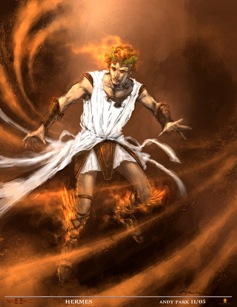
the Latin origin, Lyra. Lyra is the name of a northern constellation, and the first and last words in Phillip Pullman’s trilogy, His Dark Materials: the name of the main character, the trickster who lies abundantly, and who is surprisingly female; lovely Lyra. If Woodruff is in love with Antigone and Charles Dickens is in love with Little Red Riding Hood, I may be in love with Lyra; except I may have said the same thing about Alice roaming around in Wonderland; but they’re both fictional characters and it’s ok to be in love with multiple fictional characters, right? Either way or one, they are both amazing and brilliant females.

Now, Lyra lies, a lot, and she is extremely good at it. Hermes lied too, but maybe not as well as Lyra; but perhaps he lied better when he played music, when he appeared to be an innocent little baby, born the day before. In fact Hermes’ trick worked with Apollo. Rather than continue to scold the child, Apollo claims he deserves the fifty cattle, and praises him above and beyond the Muses on Olympus. Apollo blabbers, “Where does it come from? Really it has three things at once to choose from: fun, and love, and sweet sleep. I also serve the Muses on Olympus. Dances they love, and shimmering strains of music, Lush singing and the flutes alluring cries. But nothing has enthralled my soul as this does – However brilliant young men’s shows at banquets. Zeus’s child, your sweet playing is amazing. Young as you are, you’ve got impressive talents.” Hermes successfully tricks Apollo to forget about his mischievous deeds through his baby music.

Yet, if music is constantly tricking us, it seems this obsession with music is slightly confusing and purposeful at the same time. I don’t think people listen to their favorite music with a predetermined motive that it is going to trick them. We listen for pleasure, comfort, and entertainment just as Apollo said, without realizing he was duped, by a baby. Yet it makes sense to think that music ‘tricks,’ or relieves, us from the despondencies of life. This is why everyone has an obsession with music, either their entire life or for significant periods. It seems almost too simple; but I believe that people are unconsciously aware of music’s trickery, which thus empowers music even more.
1. What does hubris mean? -pride, arrogance
2. The eleusinian mysteries: something done - reenactment of abduction of persephone; something said - rain, conceive; and something seen - stalk of corn.
3. The five Steiner conflicts: Man vs Woman, Youth vs Age, Individual vs Society, Living vs. Dead, Gods vs Humans
4. Epithet? A handle, nickname, that refers to an attribute of a person and often stands for that person, or thing; example , trim ankles = persephone.
5. Which two characters exemplify Steiner's five conflicts? Antigone & Creon
6. Stichomythia? Rapid succession of one-liners.
7. Sparagmos? the tearing apart of live flesh.
8. Anthropocentric? Human centered; theocentric? god centered.
9. Miasma? pollution
10. Go over intro to antigone: Antigone's view of politics, notion of the moving target, Creon's name
11. The myth of eternal return, Groundhogs Day, and Demeter and Persephone: cyclical repetition
12. Hermes is everywhere: in Thor the cat, Stewie Griffin, Bart Simpson and more.
13. Thoreau suggest we read the _____ and not the ______. Eternities, Times
14. Zeus and Creon take someone from above and put them down below.
15. in ill tempore? in the great time, in the beginning.
16. Which two mythological figures are polytropic? Odysseys and Hermes
17. The three great tragedians, Escalus, Sophocles, Euripedes.
18. Who is the god of the crossroads? Hermes
19. Agon = conflict
20. All that is _______ possesses the _________.
21. The chorus in Anitgone says the two best things to happen to a person are never to be born and die.
22. Sarvam: all is fleeting, all is suffering
23. Antigone means, against birth, anti birth
24. Oedipus' injury as an infant? holes in ankle - maybe he should be called trim ankles.
25. Hermes response about his innocence: He was 'born yesterday'
26. Robert Johnson did what at the crossroads? Sold his soul to the devil to play the guitar.
27. We laugh so we don't have to cry.
28. Anagogy: the heavenly realm
29. Senex is an old man
It was during early autumn, either right before school began or just after; I believe I was still in middle school at the time.
Since my family lived a little off the beaten path we would let the cats, three total, out whenever they begged. And it was not unusual for a cat to be out all day, so today was no exception. The oldest cat 'Boots' went out one morning to peruse the neighborhood. My brother also left that morning, or the night before for a sleepover, to a friends house not very far away but in another neighborhood on the other side of Bridger Drive which we would ride our bikes too.
Later that afternoon, my mom was out running errands, I was riding my bike around the house, and my sister and dad were inside. Dan, my brother, came home on his bike with a very distressed look on his face. He ran inside and I could tell something was wrong so I followed. As I entered the house I heard my brother stuttering through sobs that he thought he saw Boots on the side of Bridger Drive, dead and mangled from being hit.
As all three of us kids started tearing up, my steadfast father knew he had to investigate. Dan and dad jumped into the pickup and went to go recover the corpse - my dad used a shovel for this roadkill since there wasn't a pitchfork handy. When they returned home Dan was still crying and my dad even looked sad. My sister and I were so worried it was Boots we didn't take dad's advice not to look to closely. When we saw the cat, I nearly vomited and we both swelled with tears. The cat had been hit and run over multiple times, so disfigured it was hardly recognizable, but it was definitely a tabby and about the right size as our Boots.

We dug a nice grave by a lovely grove of aspen trees and buried Boots' with some of his favorite toys. Each of us took turns shoveling dirt back into the grave, watching our first family cat in Bozeman slowly disappear into the earth. After much grieving, and confusion about how we would tell mom - who had picked Boots out at the Human Society roughly 3 years earlier - about the dead cat, we all went inside for some refreshments.
And like clockwork, around sunset just after the family had finished eating dinner and sharing memories of Boots, there was a scratch at the door, and there was Boots waiting to to be let in.
We buried the wrong cat.
In a way Boots was resurrected, within our own minds since we had experienced and mourned for his death. Of course Boots had no idea about his false funeral and he probably thought all the fuss we made about his return that night was weird, but he certainly didn't say no to some extra treats. To this day Boots is living strong. Though he is the oldest cat, he still parades around with youthful freedom. And it's hilarious to watch the younger cats tease and wrestle with him - the conflict between young and old also exists in the cat kingdom.
As I relived this experience in words, I admit I almost cried again at the thought of a dead, loved pet, even if it wasn't the right one. But I think Boots has some sort of power, or purpose, to live though unknowable to him. Within his cackling 'meoouuuhhh's and squeaks resonates his age, but also his wisdom as he outwrestles or scorns the other kitties. Perhaps Boots will never die since his funeral has already happened. Perhaps Boots knows that we thought he died, that we gave up waiting for him to return, and that we buried his favorite toys with some other cat who'd never played with them; and so now we're stuck with Boots forever, somewhat the opposite of Creon's fate.
And, no, we never exhumed the cat toys.